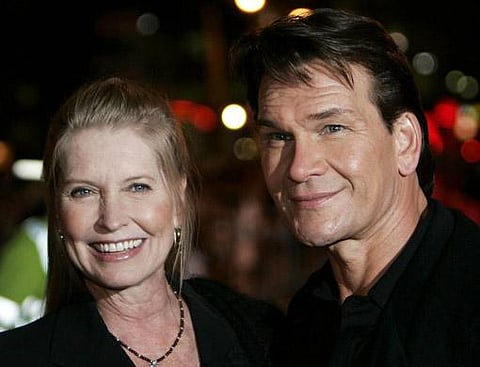Love that made Swayze a hero
Two years after his death, Patrick Swayze's wife, Lisa, revisits their 34-year marriage in her new book

Having read many books about illness, death and loss in my life, I can say most are written at a level of literary excellence which the actor Patrick Swayze's widow would not lay claim to.
Yet Lisa's account of her husband's 21-month battle with pancreatic cancer is perhaps all the more moving for that. She was his friend, his carer, his strength, his love — his wife.
The eternal vows they exchanged at the beginning of a sometimes rocky 34-year marriage were never so meaningful as when the couple glimpsed another sort of eternity hurtling towards them. "Till death us do part" were just words said on a romantic day when neither Swayze nor Lisa could possibly have imagined what they would actually mean. In places, this memoir becomes a meditation on that meaning.
When the star of Dirty Dancing and Ghost (to name but two of his hit films) died in September 2009, he had managed to complete his autobiography, The Time Of My Life — written against the odds, with his wife's help. This book, Lisa's own story, is an honest, sometimes humorous account of how he confronted his illness and death. But — far more important than that — it is a revealing story of what it is like to be a carer.
The memoir reveals just how much one woman can change when forced to confront the horrors of illness and the inevitability of those final moments. We witness the transformation of Lisa from a terrified creature who begs her just-diagnosed husband "Please don't make me do this", to the superwoman who refuses to give in, confronts every grim aspect of his nursing care and brings him home to die.
Opposites
Lisa first set eyes on Swayze when she was 14. Both wanted to be dancers, and at that time the dance school run by Swayze's mother merged with the theatre school of which Lisa was a member. But the pair were opposites. Swayze was the clean-cut, athletic, tanned, handsome all-American boy; Lisa was very shy, white-blonde and slight, and hung out "with the long-haired, misfit, doper crowd".
The Casanova all the girls fancied was not her type, but by the time she was 18, they were not just living together, but decided to get married.
In The Time Of My Life, Swayze wrote that, just before his first symptoms, "Lisa and I were enjoying a second honeymoon of sorts after a long, difficult period in which we had grown painfully apart". His widow goes into more detail. In 2003 she had left him for a whole year because of his drinking — a problem which had been escalating for 10 years.
When there was "some hope that things could be manageable", Lisa moved back in — yet gradually the relationship began to crumble once again and she felt as if she "was witnessing the living death of our marriage".
Turning it around
What changed? Interestingly, Lisa credits a session with "a psychic", a woman who apparently saw to the heart of their relationship and made them understand how to turn it around.
But to me, there seems no doubt that the second thing to save them was, paradoxically, the cancer itself. From January 2008, when the diagnosis was confirmed, Swayze and Lisa were united in their determination to "fight" the cancer and live as normal a life as possible.
That included his extraordinary decision to go ahead with shooting a gritty TV mini-series, The Beast. Lisa was with him constantly. All the while there is the regimen of increasingly complex drugs, hopes raised then dashed, the fight to stave off ancillary inflections, and so on.
What's more, like armies on a chess board, the Swayzes and their families confront the appalling intrusion of America's tabloids, which gleefully pronounce his death sentence again and again. "Emotional cruelty," Lisa calls it — and she is right.
This book's title is Worth Fighting For: Love, Loss and Moving Forward but Lisa is clearly not yet in the "moving forward" phase. Finishing the writing "one year, eight months and one day since I lost my Buddy" (his family pet name), she does not indulge in false platitudes about recovery, but acknowledges that "change is hard. And this kind of loss forces you to change And loss doesn't lie still after you lose your loved one. It tumbles and tumbles, and becomes a series — loss, after loss, after loss".
Much earlier in the story, facing the horror of what's to come, she confesses that throughout their long marriage she "had seen the best and the worst of what he could be".
Now, "faced with the worst of what could happen, I saw a true hero emerge from him. Not like one of those in the movies, but a hero who was humble, brave, loving, kind, wise and tough".
There is no doubt about that estimation of Swayze. But no one could read this touching memoir and fail to see how much the hero needed his heroine, whose every quality matched his and who goes on keeping the faith.
I couldn't help thinking of the final scene of Ghost when Swayze's ghostly character Sam says to his grieving wife, "It's amazing, the love inside, you take it with you."
— Daily Mail


